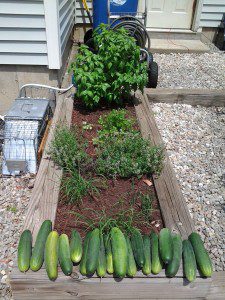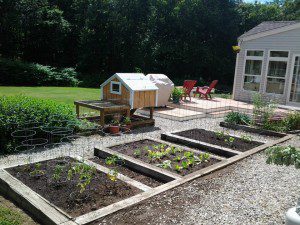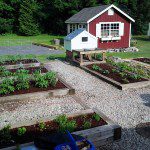
I think the biggest benefit of gardening is it grounds you. I really mean that.
We are the soil, you know. Not entirely, but it is a big part of who we are.
Adam means “soil”–he was the first, “earth-man”. Humus, where we get the word, “human” means soil too. Our bodies are formed from the soil and upon death, our bodies will return to it. In the meantime our bodies clothe our spirits.
(Which reminds me, once I asked my students in Introduction to Philosophy, “Is your body a machine?” Most of them said, “Yes, what else could it be?” When I said, “A temple” they looked at me quizzically. I tried to explain, I don’t think I convinced them.)
Gardening reminds us of who we are and where we come from. I also think it provides the tableau against which the drama of salvation is played out. Without that background I’m not sure you can really get the point of it all.
Is gardening essential to salvation?
Yes and no.
I belong to a theological tradition that loves to pare away the excess. That can be a good thing, but sometimes fools get ahold the knife and the cutting goes too deep.

Some of these people seem to think that if something is not explicitly stated in the form of a proposition in the Bible it is nonessential. What these folks miss is that deeper structure that makes a proposition comprehensible. Like the old adage, “Fish don’t know what water is until it is gone,” I think we’re beginning to see how our alienation from the workings of nature makes it harder for people to understand the message of the Bible.
People don’t learn everything they know by listening to well crafted arguments. We learn many things through our hands, and noses, and eyes, and even our tastebuds. And many of these things are never put into words. Take a seed, an inert, seemingly dead thing, press it into the fragrant earth, a living thing we know now, teeming with microscopic life, add sunshine and water, and soon something is emerging from the ground, a living thing which, if fruitful, can help you live. Amazing.
I read somewhere recently that an alarming number of people don’t know where eggs come from. You know, chicken eggs. Perhaps it is an urban legend, but the fact that something so amazing could be credible implies that some biblical metaphors may go right past some people.
What do I mean? How about this? Given that we are soil (there’s a parable about that, remember) and God’s Word is seed, and that we are expected to produce fruit, and that the Lord uses a pruning knife to makes us even more fruitful–can you begin to see how Gardening may be essential to salvation after all? At least as something people can imagine and enter into sympathetically?
Metaphors Matter
Here’s a pet peeve of mine. (I keep my peeves locked up most of the time, they’ve been known to bite.) Pastors are substituting mechanical metaphors for biblical ones.
I think it has something to do with the problem I just mentioned. Most people spend all their time in the built environment, working in air-conditioned offices, tied to machines. And so pastors talk about “plugging in” and “networking” and so on. The problems with this are legion. But perhaps the biggest one is losing touch with creation.
We may come to think of the creation itself as a kind of machine. Viewing the world as a vast machine is in part the legacy of Newtonian physics. But most of us could never know otherwise since we have so little direct contact with it.
Machines are things that people make. I’ve got nothing against them. Almost daily I marvel at the work of human hands. But that’s just it, mechanical metaphors can obscure the hand of God. Worse, the natural order can be seen as something subject to obsolescence–that’s how the transhumanists look at things. My first encounter with this line of thought came with viewing the science fiction classic, Silent Running back when I was just a kid in 1972. You don’t need to be an eco-terroist to know the natural order is something humans cannot replace.
I think another danger is we can lose the connection between the first creation and the new creation. Paul, for instance, speaks of the mortal body as a seed that falls to the ground only to rise again in the new creation. (Don’t get me started on Christians and how cremation obscures this.) But we don’t do that with our old mobile phones. Those fall into the landfill of forgetfulness never to return.
You know, I can’t help but think that these preachers consider Jesus a “Johnny come lately” to creation, sort of wandering around and arbitrarily selecting things to illustrate his message. I’ve actually heard these guys say things like, “If Jesus were alive today he’d use metaphors drawn from high tech.” And I think to myself, “Have you ever read the Gospel of John?”
The Logos spoke long before Jesus walked the countryside in Galilee. In fact, those fields were spoken into being by the very Logos who walked around in them. Christians believe the metaphors he crafted were based on the very natural processes he created. Do you suppose he had those metaphors in mind when he made those processes?
No, I don’t believe you need to be a gardener to be saved, but I think it sure helps.












